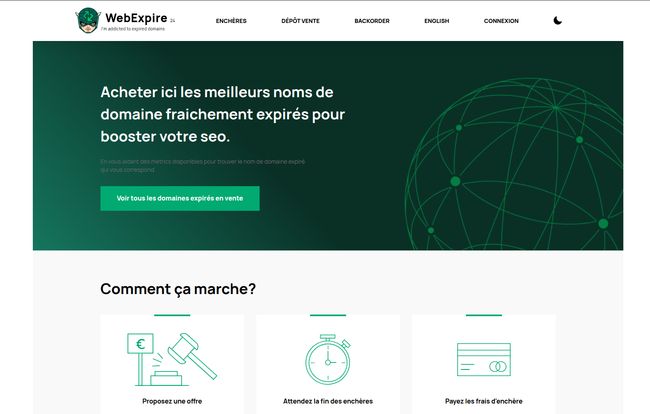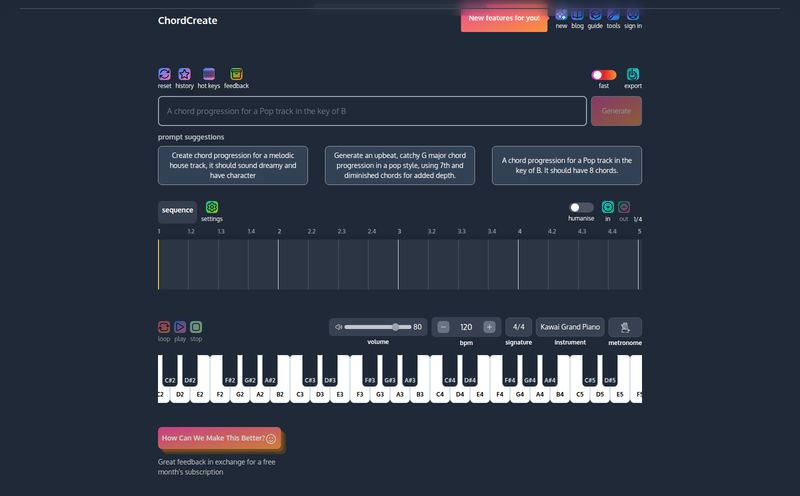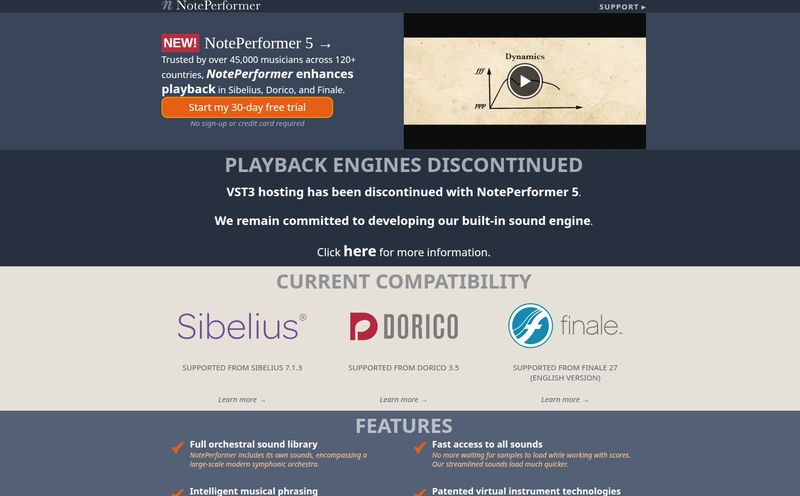The SEO grind is... well, a grind. We pour our hearts, souls, and an ungodly amount of coffee into creating great content, building relationships, and begging for backlinks. It’s a slow burn. A marathon. But what if there was a way to get a little head start? To step into a race that's already a few laps in?
I’ve been in this game for years, and I’m always on the lookout for an edge. Not a black-hat, get-you-banned-from-Google kind of edge, but a smart, strategic advantage. That's where the fascinating, and often misunderstood, world of expired domains comes in. And today, I want to talk about a platform that's caught my eye, especially for those of us with an eye on the European market: WebExpire.
First Off, Why Should You Even Care About Expired Domains?
Imagine a prime piece of real estate in a bustling city. The previous owner built a beautiful shop, established a great reputation, and had roads leading to it from all over town. Then, for whatever reason, they forgot to renew their lease. The building is empty, but the location, the reputation, and all those roads? They’re still there.
That's an expired domain in a nutshell. It's a domain name someone owned, built up with content and backlinks, but then failed to renew. When you buy it, you’re not just getting a name; you're potentially inheriting its history, its authority, and most importantly, its existing backlink profile. All that lovely “link juice” can be pointed to your main site, used to kickstart a new project, or become part of a Private Blog Network (PBN). It’s a powerful strategy, but only if you know what you're doing.
Getting Acquainted with WebExpire
So, where do you find these digital fixer-uppers? Marketplaces, of course. And WebExpire (domexpire.fr) is one such marketplace. From the get-go, you can tell it has a specific flavor. It’s a French platform, and it’s an AFNIC-accredited registrar. For those who dont know, AFNIC is the registry that manages .fr domain names. This isn't just a random detail; it means WebExpire is a serious player in the French-speaking web space. They have a direct line to creating and managing .fr domains, which gives them a huge leg up in that niche.
The Auction Process: How to Snag a Domain
The main way to get a domain on WebExpire is through their auction system. It’s pretty straightforward if you’ve ever been on eBay, but let’s walk through it.
- Place Your Bid: You see a domain you like. You’ve done your homework (checked its backlink profile on Ahrefs, looked at its history on the Wayback Machine, made sure it’s not full of spam). You place your starting bid, which seems to be around 30€. An interesting twist they use is that the final price is determined by the second-highest bid plus an increment. It keeps things a bit more honest than a straight-up highest-bid-wins scenario.
- The Waiting Game: Now you watch. The platform will let you know if you've been outbid, giving you a chance to up your offer. This can be a nail-biting experience, especially if you’ve found a real gem.
- Pay Up: If you win, congrats! You pay the auction price plus the domain registration or transfer fee, and the domain is yours. Time to pop the champagne and start redirecting that sweet, sweet link juice.
It's a classic auction model. Simple and effective.
The Real Pro Move: WebExpire's Backorder Service
Now, this is where things get really interesting for me. Auctions are great, but they're reactive. You're bidding on what's already available. A backorder service is proactive.
WebExpire lets you place a backorder on a domain that is set to expire but hasn't dropped yet. You’re essentially telling them, “Hey, if this domain becomes available, I want to be the first in line to grab it.” It's like calling dibs. This service starts at 30€ HT (hors taxes, or excluding VAT). For a high-value domain, that's a small price to pay to get ahead of the auction frenzy.

Visit WebExpire
I’ve found that the best domains rarely even make it to a public auction; they’re snapped up by backorder services the second they drop. Using this feature is moving from being a hopeful spectator to a serious player.
The Good, The Bad, and The Honest Truth
No platform is perfect, right? Here’s my no-fluff breakdown of WebExpire.
What I Genuinely Like
The opportunity here is massive. Finding a clean, relevant expired domain can give you an SEO boost that would otherwise take months or even years and thousands of dollars to build from scratch. It's a genuine shortcut. I particularly love the .fr specialization. If you're targeting the French market, using a specialist platform like WebExpire just makes sense. They understand the landscape, and being AFNIC-accredited adds a layer of trust that you don’t always get with generic global registrars. The backorder service is also a huge plus for me, as its often the best way to secure top-tier domains.
The Reality Check
Now, let’s not get carried away. This isn’t a magic wand. First, you need to know what you’re looking for. Buying a junky, spam-filled expired domain can actually hurt your SEO. You have to be comfortable analyzing metrics like Domain Authority, Trust Flow, and checking a site's history. Second, the auction system is competitive. If a domain is good, you won’t be the only one who knows it. Be prepared for bidding wars. And finally, there are no guarantees. You can spend hours researching and still get outbid at the last second. It’s part of the game.
So, Who Is WebExpire Really For?
Is this a tool for every website owner? Probably not. I see it being most effective for a few specific groups:
- Experienced SEOs & Agencies: People who know how to evaluate a domain's worth and have a strategy for it, whether it's for building a PBN, a niche site, or giving a new client a kickstart.
- Affiliate Marketers: Building out a portfolio of niche sites on aged domains is a classic, and very effective, affiliate strategy.
- Domain Investors: Those who specialize in domain flipping will find the .fr focus particularly interesting for portfolio diversification.
If you're a total beginner just starting your first blog, I'd say hold off. Learn the fundamentals of SEO first. Diving into expired domains without that foundation is like trying to run before you can walk. You'll probably just trip.
My Final Verdict: A Powerful Tool in the Right Toolbox
So, is WebExpire a worthwhile platform? In my opinion, yes. Absolutely. But with a big ol' asterisk.
It's a specialized tool for a specialized task. If you understand the power of expired domains and, crucially, if you operate in or target the French-speaking market, WebExpire should be on your radar. Its AFNIC accreditation and focus on .fr domains make it a standout choice in that arena. It's a sharp, effective instrument.
For those of us targeting primarily US or global markets, platforms like GoDaddy Auctions might be more comprehensive. But the principles remain the same. Do your research, bid smart, and you might just land the SEO equivalent of a winning lottery ticket.
Frequently Asked Questions (FAQs)
- 1. Is buying expired domains considered a 'black hat' SEO tactic?
- It depends entirely on how you use them. If you buy a domain and 301 redirect it to your main site to pass authority, that's generally considered a grey-hat but widely accepted practice. If you use it to build a spammy PBN with low-quality content, you're straying into darker territory. The key is to provide value.
- 2. How much does a good expired domain cost on WebExpire?
- It's like asking 'how much does a used car cost?' It varies wildly. Bids start around 30€, but a premium domain with a stellar backlink profile could go for hundreds or even thousands of euros. Your budget will depend on the domain's quality and the competition.
- 3. What are the key metrics to look for in an expired domain?
- You'll want to check its Domain Authority/Rating (from tools like Moz or Ahrefs), the number and quality of its referring domains, its spam score, and its history using the Wayback Machine (archive.org) to make sure it wasn't used for anything sketchy in the past.
- 4. What is AFNIC and why is WebExpire's accreditation important?
- AFNIC is the official registry for .fr (France), .re (Reunion Island), and other French overseas territories. An accredited registrar has a direct, trusted relationship with the registry, which often means faster, more reliable service and better pricing for those specific domain extensions.
- 5. Can I use WebExpire for domains other than .fr?
- While their specialty is clearly .fr, you can find other TLDs like .com or .net in their auctions from time to time. However, their main competitive advantage and focus lies with the French domain space.
- 6. What's the difference between an auction and a backorder?
- An auction is for domains that are already expired and available for public bidding. A backorder is a service where you pay to have the platform attempt to register a domain for you the instant it becomes available, before it hits a public auction.



